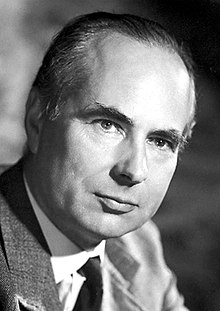
Back أندرو هكسلي Arabic اندرو هكسلى ARZ اندرو هاکسلی AZB Эндру Філдынг Хакслі Byelorussian Андрю Хъксли Bulgarian অ্যান্ড্রিউ ফিল্ডিং হ্যাক্সলি Bengali/Bangla Andrew Huxley Catalan ئەندرو ھۆکسلی CKB Andrew Fielding Huxley Czech Andrew Huxley Welsh
Andrew Huxley | |
|---|---|
 Huxley in 1963 | |
| Born | Andrew Fielding Huxley 22 November 1917 Hampstead, London, England |
| Died | 30 May 2012 (aged 94) Cambridge, England |
| Alma mater | University of Cambridge |
| Known for | |
| Spouse |
J. Richenda G. Pease
(m. 1947; died 2003) |
| Children | 6 |
| Parent |
|
| Relatives | Huxley family |
| Awards |
|
| Scientific career | |
| Fields | |
| Institutions | |
Sir Andrew Fielding Huxley OM FRS HonFREng (22 November 1917 – 30 May 2012) was an English physiologist and biophysicist.[1][2] He was born into the prominent Huxley family. After leaving Westminster School in central London, he went to Trinity College, Cambridge, on a scholarship, after which he joined Alan Hodgkin to study nerve impulses. Their eventual discovery of the basis for propagation of nerve impulses (called an action potential) earned them the Nobel Prize in Physiology or Medicine in 1963. They made their discovery from the giant axon of the Atlantic squid. Soon after the outbreak of the Second World War, Huxley was recruited by the British Anti-Aircraft Command and later transferred to the Admiralty. After the war he resumed research at the University of Cambridge, where he developed interference microscopy that would be suitable for studying muscle fibres.
In 1952, he was joined by a German physiologist Rolf Niedergerke. Together they discovered in 1954 the mechanism of muscle contraction, popularly called the "sliding filament theory", which is the foundation of our modern understanding of muscle mechanics. In 1960 he became head of the Department of Physiology at University College London. He was elected a Fellow of the Royal Society in 1955, and President in 1980. The Royal Society awarded him the Copley Medal in 1973 for his collective contributions to the understanding of nerve impulses and muscle contraction. He was conferred a Knight Bachelor by the Queen in 1974, and was appointed to the Order of Merit in 1983. He was a fellow of Trinity College, Cambridge, until his death.
- ^ Huxley, Andrew F. (2004). "Andrew F. Huxley". In Squire, Larry R. (ed.). The History of Neuroscience in Autobiography. Vol. 4. Academic Press and Society for Neuroscience. pp. 282–318. ISBN 0-12-660246-8.
- ^ Goldman, Yale E.; Franzini-Armstrong, Clara; Armstrong, Clay M. (2012). "Andrew Fielding Huxley (1917–2012)". Nature. 486 (7404): 474. Bibcode:2012Natur.486..474G. doi:10.1038/486474a. PMID 22739307.
© MMXXIII Rich X Search. We shall prevail. All rights reserved. Rich X Search